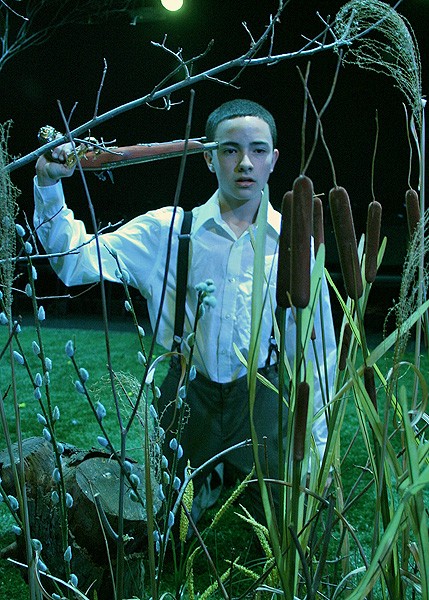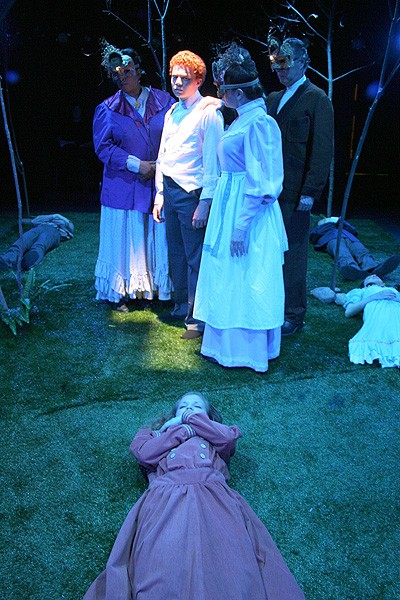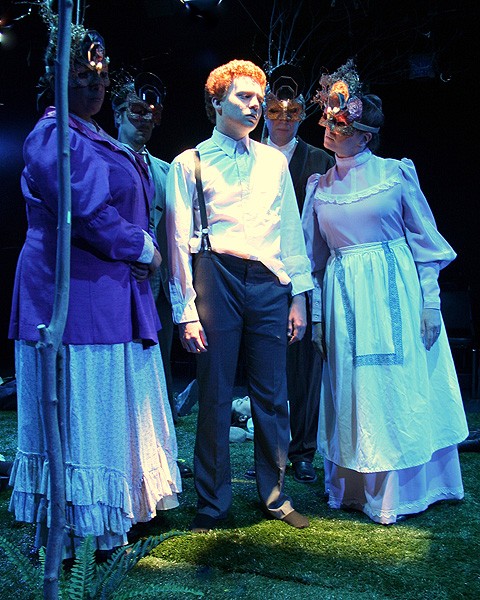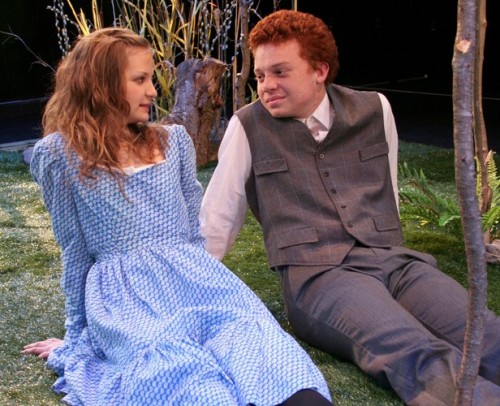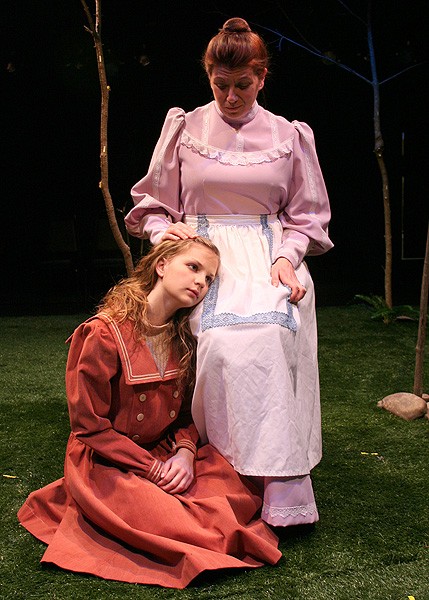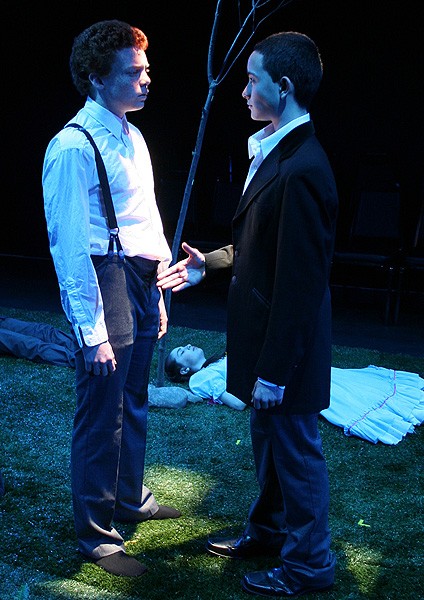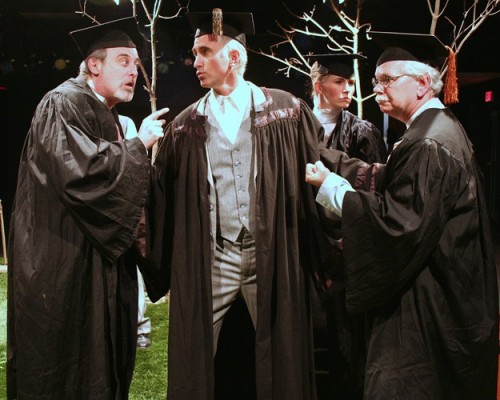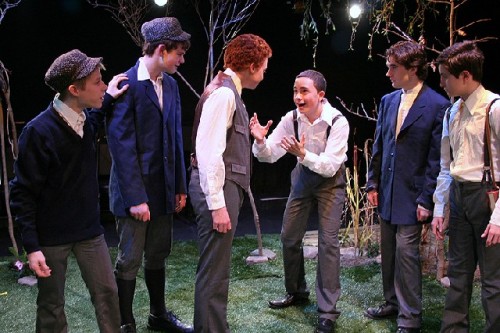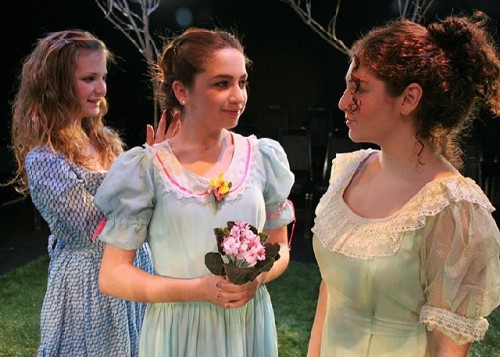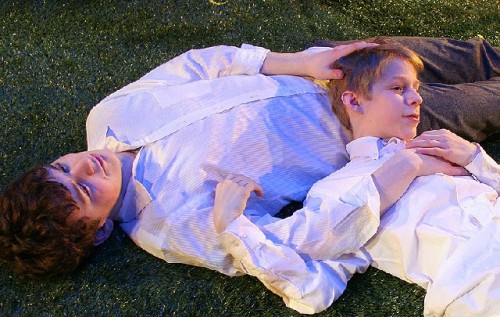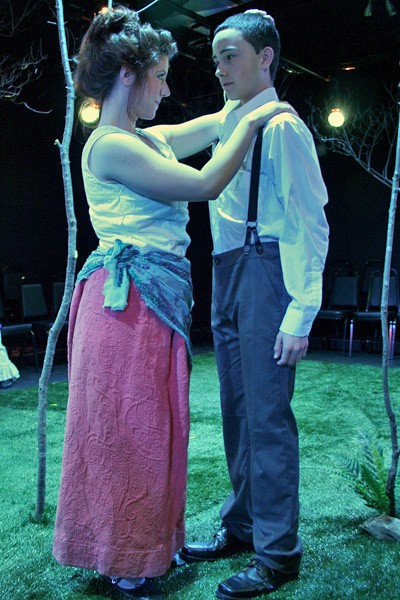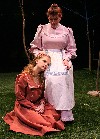Spring Awakening Blossoms at Boston's Zeitgeist Stage
A Very Young Cast Takes on a Very Old Sex Ed Play
By: Larry Murray - Apr 20, 2009
Zeitgeist Stage Company presents Spring Awakening The Play by Frank Wedekind, Translated by Reinhold A. Mahler, Adapted by David J. Miller, Direction and Scenic Design by David J. Miller, Lighting Design by Chris Fournier, Sound Design by Walter Eduardo, Costume Design by Krystel Bly, Fight Director - Meron Langsner, Production Stage Manager - Deirdre Benson, Assistant Stage Manager - Cara Pacifico, MakeUp Design - Judith Leonardo.
Cast: Jake Berger - Herr Gabor, Uncle Probst, Havesoon; Douglas Cochrane - Headmaster, Sunstroke; Keenan Cochrane - Georg, Helmut; Michael Steven Costello - Professor Tonguetwister, Goat, Dr. Fitzzpowder; Michelle Dowd - Frau Gabor; Amelia Estrada - Thea; Ruby Fox - Ilse; Gabe Goodman - Haenschen, Dieter; Sam Harnish - Otto, Rupert; Sara Jones - Ina, MOther Schmidt, Professor Thickswitch; Paul McCalllion - Melchior; Maria Mogavero - Frau Bergmann; Carlos Rojas - Moritz; Bill Salem - Professor Flyswatter, Reverend Baldbelly; Chuck Schwager - Herr Steifel; Rebecca Stevens - Wendia; Cameron VanderWerf - Ernst, Reinhold; alia Weingarten - Martha.
Playing through May 9 at the Boston Center for the Arts Plaza Black Box Theatre, 539 Tremont Street, Boston. Handicap accessible. About 2 hours, 45 minutes with one intermission. Quick Link to Zeitgeist Stage Company
Undoubtedly Spring Awakening is one of the most controversial plays ever written, and the Zeitgeist Stage Company demonstrates considerable pluck to not only present it as written, but also gone so far as to cast barely post-pubescent teens in the roles of the students. The plot is relatively simple and straightforward. Its fourteen-year-old heroine, Wendla, is date-raped by Melchior, and then killed by abortion pills. The young Moritz, terrorized by the world around him, and especially by his teachers, shoots himself. Repercussions follow, ruining Melchior's life. The only happy people in the play are two gay boys who are in love. The play has such controversial content, it almost asks for trouble. Oddly, the play has no nudity, and surprisingly little of it is either sexy or sensual. All those German Victorian garments clearly dampen the charges of pornography. Yet it remains scandalous.
As enlightened as we think we are today, we are still nervous nellies when it comes to teenage sex, and need only look back to the Bush administration's attempts to withhold accurate, useful sexual information from teens through their standard of "abstinence only" sex education. Seeing this provocative production opens our eyes to the fact that some of the same shameful attitudes that tortured German youths in the 1890s still exist today, and still cause teens to commit suicide in this post-Columbine era.
And the authorities have tried to kill this troublemaker of a play since its inception. Heavy censorship greeted its premiere in Germany in 1906, followed by an equally disastrous one night run in New York City, in 1917, where it closed amid public outrage and charges of obscenity. Even the Broadway musical version of Spring Awakening pulls its punches. The rape scene between Melchior and Wendla becomes consensual sex in that partially sanitized version, and believe it or not, people still walk out of performances in a huff. Perhaps it had more to do with the lyrics, with its "F bomb" word and "The Bitch of Living" song refrain than anything in the musical's sanitized book which is adapted from the Wedekind script.
The Broadway play was initially cast with actors as old as 22 to play the teens. Understandably, most casts have not been composed of 14 and 15 year old actors. "We pity the director who tries that one," said one wag. But this is exactly what Zeitgeist did, and it is a mixed blessing. Of course there are also plenty of adults in the large cast as well. We spoke with director David J. Miller in an earlier interview about this Zeitgeist production, and were anxious to see the final result.
In this new translation, by Reinhold A. Mahler, the story traces the sexual awakenings of the teens who are at once both innocent, and not the least bit innocent at all. The struggle remains relevant in 2009 since their pain and blind spots are just as visible in today's sex-obsessed society, and - all too often - just as poorly handled.
During the unfolding of the play we are brought face to face with all the variations on sex, from date rape and botched abortions, to homosexuality, S & M, masturbation, child abuse, bullying and ultimately, suicide. Everything that once brought out the censor's scissors to snip away is restored in this stunning Zeitgeist production. The story unfolds in a torrent of brief, succinct scenes, one building on the other, to reach its climatic scene, which turns the play from a realistic depiction of German teen angst to an expressionistic morality tale about life and death.
One should see this play before the musical since it provides important insights and details. The musical made cuts to make room for the music. While the musical's book hews close to the points in the play, the songs wander off, giving voice to the internal turmoil felt by the teens. When it's rock 'n roll, it's not Wederkind talking, it is Duncan Sheik. However it is Sheik who is better at capturing the bizarre comic spirit of this play which is difficult to bring to life on stage.
In its original Broadway production Steven Sater, the writer of the book and lyrics, wanted a very young cast, and quickly discovered that it didn't work. In a workshop before the off-Broadway run they tried younger teens, hoping to give them enough time to find their way through the difficult material, to learn their roles, and develop nuanced performances. Michael Mayer, the director, found this very difficult to achieve, especially since the youngsters were just beginning to go through a lot of what the play itself describes. Ultimately he decided to cast older actors.
So how did Zeitgeist's gamble work? The cast Miller chose is mostly up to the task, remembering their lines and stage directions with few stumbles, and audiences can look forward to many moments of theatrical incandescence. Of the twelve teens, Carlos Rojas, as Moritz, is an absolute standout, as is his pal, Melchior, well played by Paul McCallion. Rebecca Stevens is very affecting as Wendla, though, like many of the players, is occasionally hard to hear. Of all the actors, Rojas has the best opportunity to layer his performance; especially in the final graveyard scene where he probes deeply into the mind and spirit of the departed Moritz. As Melchior, McCallion is a suitably reluctant participant in the S & M scene with Wendla, though Rebecca Stevens will need to work on her lower vocal register to sound more assertive and dominatrix-like.
Tom Menino, the Mayor of Boston, has the nickname "Mumbles" Menino. Like all teenagers he has had the awful experience of being accused of mumbling, of not "speaking up". This lack of speaking volume and enunciation is the one fault of this production. If corrected, it would turn this review into a rave, and likely elicit standing ovations. The problem is that much of the play, when the teens are on stage, turned out to be awful hard slogging for these old ears.
The teens cast in today's productions often lack the ability to project their voices beyond the other actors and the first few rows of the audience. Is it that they lack natural resonance? Or is so much time and energy spent on just showing up, rehearsing, and memorizing lines, that the use of the lungs and diaphragm is pretty much ignored in preparing young actors for the stage. Let's be grateful that the acting was not adenoidal which sometimes is the way younger players compensate.
As the second act of Spring Awakening begins, there is a group of adults on stage, and it is almost as if someone turned up the volume for a midnight commercial. Compared to the kids, they almost seem to be shouting, and that's when that the realization came that much of the audience had been straining to hear the words for large stretches of Act One.
Perhaps the volume problem (which also affected portions of Speech and Debate at the Lyric Stage a couple of weeks ago) is partly the result of the fact that vocal prowess takes years to develop. Somewhere in the training of actors these skills needs to be taught.
Some of the minor characters seem to wrestle with delivering their lines. They never got to the important business of fine tuning performances to make their characters emerge as genuine individuals. It is difficult to make small parts more than archetypal cartoon cutouts; so this may be quibbling. For the most part, all of the young actors got on stage and delivered the goods. Let us hope that as the run continues over the next few weeks there is time to improve and refine their acting skills to a higher level of accomplishment. Acting is hard work and audiences demand not just the good, but the extraordinary from performers.
This being an old play, it is very long and we all know about the shortened attention spans and changing tastes of our times. Some judicious pruning would have allowed more polishing during the limited preparation period, too.
The play is staged in the round, which always seem to trap the players into circular patterns which are very unnatural. For example, Michelle Dowd was positively electrifying as Frau Gabor, and her second act speech was as emotionally wrenching as any in the theatrical canon. But her constant moving about so as to face all parts of the audience diluted the authenticity of her delivery. If only she were able to build her monologue using movements that were more character-driven, the "near" tears that I felt might have become a genuine gusher.
Clearly this play was written for a proscenium production rather than a theatre that places the audience on four sides of the rectangular space of the Plaza Black Box Theatre. This contributed to a lighting problem.
Lighting for theatre in the round is difficult since you don't want the lights to shine in the audiences eyes, thereby distracting them. So most of the lights were generic washes pointing straight down from the ceiling. It's like taking noontime photos with the sun directly overhead. Chris Fournier, who has considerable lighting experience, is not to be faulted as much as the limitations of the space. But oh how it would help the production if better lighting enabled us to witness the acting more clearly.
Still, the work overcomes its production limitations. Originally titled,"The Tragedy of Childhood: Spring Awakening." Wedekind offers a searing indictment of adult hypocrisy as seen through the children's pain and confusion. Zeitgeist's company of 18 actors, young and old, playing 28 parts acquitted itself well.
As usual, it was the adults who put this concept together, yet it was left to the kids to pull it off.This is quite a lot to ask from youngsters who go to school, live with parents, and have their own problems and relationships to deal with. But pull it together they did, and, in the final analysis, the Zeitgeist version gives us insights into the popularity phenomenon of the Musical. Now with 18 productions around the world, it won eight Tony Awards. This speaks volumes about the relevance of the subject matter, even 118 years after it was written.
In another century, say 2109, is it possible that the musical will have come and gone, while the play itself is still debated, censored and performed? You can bet on it. For just as long as there are teenagers with questions about sex and how babies are made, and adults who evade the simple facts, while thinking they know best, it will still be timely.
Quick Link to Zeitgeist Stage Company

